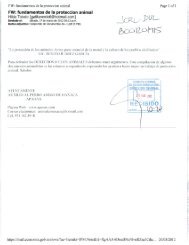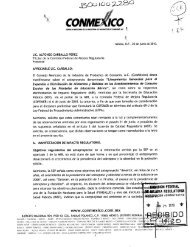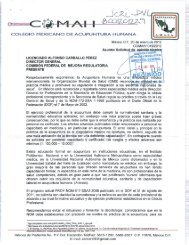Untitled
Untitled
Untitled
Create successful ePaper yourself
Turn your PDF publications into a flip-book with our unique Google optimized e-Paper software.
Acrylamide<br />
Acrylamide is a chemical which has been shown to be<br />
carcinogenic in some tests on laboratory animals, and can<br />
be formed from carbohydrates during the production or<br />
cooking of foods at high temperatures. The possible effects of<br />
dietary acrylamide on cancer risk in humans have been<br />
reviewed by the Joint FAO/WHO Expert Committee on Food<br />
Additives (http://www.who.int/foodsafety/chem/chemicals/<br />
acrylamide/en/). This committee concluded in 2005 that,<br />
based on comparisons with the intake shown to cause<br />
mammary tumours in rats, acrylamide intakes in humans are<br />
generally low but that there is a possible human health<br />
concern for high consumers. Epidemiological data available<br />
are limited but have not suggested any association of<br />
estimated dietary acrylamide intake with cancer risk in<br />
humans (Mucci and Adami, 2005; Pelucchi et al., 2006;<br />
Wilson et al., 2006).<br />
Conclusions and recommendations<br />
Carbohydrates as a group have not been intensively<br />
investigated in epidemiological studies of diet and cancer.<br />
There is a moderately large amount of data on the possible<br />
association between dietary fibre and the risk for colorectal<br />
cancer; the results of studies have varied and no firm<br />
conclusion can be drawn, but the available data suggest<br />
that high intakes of dietary fibre possibly reduce the risk<br />
for colorectal cancer. There are also limited data which<br />
suggest that high intakes of sucrose might increase the<br />
risk for colorectal cancer and that high intakes of lactose<br />
might increase the risk for ovarian cancer. For other<br />
components of carbohydrates and other types of cancer,<br />
the available data are too sparse to draw any conclusions.<br />
Further research is needed on the possible associations<br />
of carbohydrates with cancer risk. The systematic review<br />
being conducted by the World Cancer Research Fund<br />
will provide a detailed update in 2007. Further information<br />
could also be provided by extending the Pooling Project<br />
of Prospective Studies of Diet and Cancer to examine<br />
specific classes of carbohydrates in relation to a range of<br />
cancer sites.<br />
Acknowledgements<br />
We thank Dr Arthur Schatzkin, Professor Stephanie Smith-<br />
Warner, Professor Carolyn Summerbell, Dr Anne Tjonneland,<br />
Professor PA van den Brandt and Dr Martin Wiseman for their<br />
constructive comments. The authors are supported by Cancer<br />
Research UK.<br />
Conflict of interest<br />
During the preparation and peer-review of this paper in<br />
2006, the authors and peer-reviewers declared the following<br />
interests.<br />
Carbohydrates and cancer<br />
TJ Key and EA Spencer<br />
Authors<br />
Professor Timothy J Key: None declared.<br />
Dr Elizabeth A Spencer: None declared.<br />
Peer-reviewers<br />
Dr Arthur Schatzkin: None declared.<br />
Professor Stephanie Smith-Warner: None declared.<br />
Professor Carolyn Summerbell: None declared.<br />
Dr Anne Tjonneland: None declared.<br />
Professor PA van den Brandt: None declared.<br />
Dr Martin Wiseman: None declared.<br />
References<br />
Alberts DS, Martinez ME, Roe DJ, Guillen-Rodriguez JM, Marshall JR,<br />
van Leeuwen JB et al. (2000). Lack of effect of a high-fiber cereal<br />
supplement on the recurrence of colorectal adenomas. Phoenix<br />
Colon Cancer Prevention Physicians’ Network. N Engl J Med 342,<br />
1156–1162.<br />
Amant F, Moerman P, Neven P, Timmerman D, Van Limbergen E,<br />
Vergote I (2005). Endometrial cancer. Lancet 366, 491–505.<br />
Augustin LS, Gallus S, Bosetti C, Levi F, Negri E, Franceschi S et al.<br />
(2003). Glycemic index and glycemic load in endometrial cancer.<br />
Int J Cancer 105, 404–407.<br />
Banks E, Beral V, Reeves G (1997). The epidemiology of epithelial<br />
ovarian cancer: a review. Int J Gynecol Cancer 7, 425–438.<br />
Beresford SA, Johnson KC, Ritenbaugh C, Lasser NL, Snetselaar LG,<br />
Black HR et al. (2006). Low-fat dietary pattern and risk of colorectal<br />
cancer: the women’s health initiative randomized controlled<br />
dietary modification trial. JAMA 295, 643–654.<br />
Bergstrom A, Pisani P, Tenet V, Wolk A, Adami HO (2001).<br />
Overweight as an avoidable cause of cancer in Europe. Int J Cancer<br />
91, 421–430.<br />
Berrington de Gonzalez A, Sweetland S, Spencer E (2003). A metaanalysis<br />
of obesity and the risk of pancreatic cancer. Br J Cancer 89,<br />
519–523.<br />
Bingham SA, Norat T, Moskal A, Ferrari P, Slimani N, Clavel-<br />
Chapelon F et al. (2005). Is the association with fiber from foods<br />
in colorectal cancer confounded by folate intake? Cancer Epidemiol<br />
Biomarkers Prev 14, 1552–1556.<br />
Bonithon-Kopp C, Kronborg O, Giacosa A, Rath U, Faivre J (2000).<br />
Calcium and fibre supplementation in prevention of<br />
colorectal adenoma recurrence: a randomised intervention trial.<br />
European cancer prevention organisation study group. Lancet 356,<br />
1300–1306.<br />
Bosch FX, Ribes J, Cleries R, Diaz M (2005). Epidemiology of<br />
hepatocellular carcinoma. Clin Liver Dis 9, 191–211.<br />
Bostick RM, Potter JD, Kushi LH, Sellers TA, Steinmetz KA, McKenzie<br />
DR et al. (1994). Sugar, meat, and fat intake, and non-dietary risk<br />
factors for colon cancer incidence in Iowa women (United States).<br />
Cancer Causes Control 5, 38–52.<br />
Botterweck AA, van den Brandt PA, Goldbohm RA (2000). Vitamins,<br />
carotenoids, dietary fiber, and the risk of gastric carcinoma: results<br />
from a prospective study after 6.3 years of follow-up. Cancer 88,<br />
737–748.<br />
Burkitt DP (1969). Related disease—related cause? Lancet 2,<br />
1229–1231.<br />
Burley VJ (1997). Sugar consumption and cancers of the digestive<br />
tract. Eur J Cancer Prev 6, 422–434.<br />
Burley VJ (1998). Sugar consumption and human cancer in sites<br />
other than the digestive tract. Eur J Cancer Prev 7, 253–277.<br />
Chan JM, Gann PH, Giovannucci EL (2005). Role of diet in prostate<br />
cancer development and progression. J Clin Oncol 23, 8152–8160.<br />
Cho E, Spiegelman D, Hunter DJ, Chen WY, Colditz GA, Willett WC<br />
(2003). Premenopausal dietary carbohydrate, glycemic index,<br />
S119<br />
European Journal of Clinical Nutrition
















